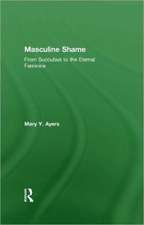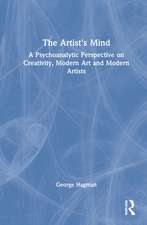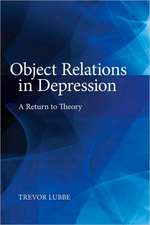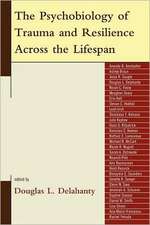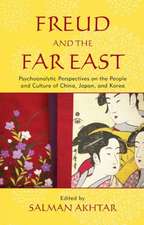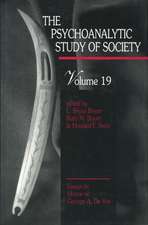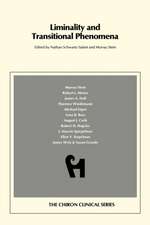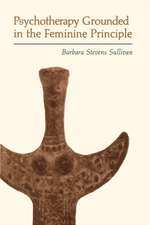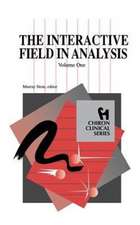The Mystery of Analytical Work: Weavings from Jung and Bion
Autor Barbara Stevens Sullivanen Limba Engleză Hardback – 15 oct 2009
Examining the work of both Jung and Bion, Sullivan draws on the overlap between their ideas on the psyche and the nature of the unconscious. The book uses clinical examples to examine the implications that these perspectives have for the practising therapist.
Specific areas of discussion include:
- the creative unconscious
- the structure of narcissism
- transformation in analytic work.
| Toate formatele și edițiile | Preț | Express |
|---|---|---|
| Paperback (1) | 382.58 lei 6-8 săpt. | |
| Taylor & Francis – 7 oct 2009 | 382.58 lei 6-8 săpt. | |
| Hardback (1) | 974.38 lei 6-8 săpt. | |
| Taylor & Francis – 15 oct 2009 | 974.38 lei 6-8 săpt. |
Preț: 974.38 lei
Preț vechi: 1025.66 lei
-5% Nou
Puncte Express: 1462
Preț estimativ în valută:
186.45€ • 203.16$ • 157.11£
186.45€ • 203.16$ • 157.11£
Carte tipărită la comandă
Livrare economică 23 aprilie-07 mai
Preluare comenzi: 021 569.72.76
Specificații
ISBN-13: 9780415547758
ISBN-10: 041554775X
Pagini: 280
Dimensiuni: 156 x 234 mm
Greutate: 0.57 kg
Ediția:New.
Editura: Taylor & Francis
Colecția Routledge
Locul publicării:Oxford, United Kingdom
ISBN-10: 041554775X
Pagini: 280
Dimensiuni: 156 x 234 mm
Greutate: 0.57 kg
Ediția:New.
Editura: Taylor & Francis
Colecția Routledge
Locul publicării:Oxford, United Kingdom
Public țintă
Postgraduate, Professional, and Professional Practice & DevelopmentCuprins
Beginning with Relatedness. The Creative Unconscious and the Self. The Work of Life. The Structure of Pathology. Truth and Lies. The Listening Process. Transformation.
Recenzii
"This is a marvellously integrative work. The author is a widely read Jungian analyst who has created bridges between depth psychology and Wilfred Bion's contributions as well as contextualizing each of them in the matrix of relatedness, extending the currently evolving two-person model of the analytic situation. Relatedness, she shows, is the sine qua non of being alive and consequently the real key to how analysis works. Analyst and analysand are both "patients" in the presence of emotions and the (unequal) effect of them upon each other. I recommend this book to all mental health professionals." – James Grotstein, Supervising Analyst, Psychoanalytic Center of California and New Center for Psychoanalysis, Los Angeles, USA
"One of the most neglected features of theory and practice in psycho-analysis and psycho-analytic therapy is the simple fact that healing comes about through a relationship between two persons. Psychotherapy is not a thing, it is not a machine but a living relationship between two people. Healing comes about through an emotional contact; this contact is creative and healing. Barbara Sullivan has made this the corner-stone of her building and she has done it clearly and bravely. I say bravely because she challenges respected authors and shows how their tonal descriptions annihilate the personal. This is a wonderful book and will be a treasure for psychotherapists and patients. It also opens up a whole new vision of what psychotherapy will, I hope, become in the next few decades." - Neville Symington, author of A Pattern of Madness, Fellow of the British Psycho-Analytical Society and Past President of the Australian Psycho-Analytical Society
"Sullivan explores the theories of two difficult analysts, Jung and Bion, explaining their ideas clearly and demonstrating how each of their perspectives enriches the other's. Her detailed clinical material makes her thinking come alive and should help clinicians of any perspective to deepen their work." - Marjorie Nathanson, Past President of the C.G. Jung Institute of San Francisco, and member of the IAAP Executive Committee
"This is a generous and personal book which will contribute to the growing interest in the Jungian community in the links between Jung and Bion...The lucidity of Sullivan’s style will ensure a wide readership, not confined only to clinicians but to a wider public interested in culture, the arts and philosophy." – Geraldine Godsil, Journal of Analytical Psychology, 56, 2011
"This is a marvellously integrative work. The author is a widely read Jungian analyst who has created bridges between depth psychology and Wilfred Bion's contributions as well as contextualizing each of them in the matrix of relatedness, extending the currently evolving two-person model of the analytic situation. Relatedness, she shows, is the sine qua non of being alive and consequently the real key to how analysis works. Analyst and analysand are both "patients" in the presence of emotions and the (unequal) effect of them upon each other. I recommend this book to all mental health professionals." – James Grotstein, author of A Beam of Intense Darkness: Wilfred Bion's Legacy to Psychoanalysis and Training and Supervising Analyst, Psychoanalytic Center of California & New Center for Psychoanalysis, Los Angeles, USA
"One of the most neglected features of theory and practice in psycho-analysis and psycho-analytic therapy is the simple fact that healing comes about through a relationship between two persons. Psychotherapy is not a thing, it is not a machine but a living relationship between two people. Healing comes about through an emotional contact; this contact is creative and healing. Barbara Sullivan has made this the corner-stone of her building and she has done it clearly and bravely. I say bravely because she challenges respected authors and shows how their tonal descriptions annihilate the personal. This is a wonderful book and will be a treasure for psychotherapists and patients. It also opens up a whole new vision of what psychotherapy will, I hope, become in the next few decades." - Neville Symington, Author of A Pattern of Madness, Fellow of the British Psycho-Analytical Society and Past President of the Australian Psycho-Analytical Society
"Sullivan explores the theories of two difficult analysts, Jung and Bion, explaining their ideas clearly and demonstrating how each of their perspectives enriches the other's. Her detailed clinical material makes her thinking come alive and should help clinicians of any perspective to deepen their work." - Marjorie Nathanson, Past President of the C. G. Jung Institute of San Francisco, and member of the IAAP Executive Committee
"One of the most neglected features of theory and practice in psycho-analysis and psycho-analytic therapy is the simple fact that healing comes about through a relationship between two persons. Psychotherapy is not a thing, it is not a machine but a living relationship between two people. Healing comes about through an emotional contact; this contact is creative and healing. Barbara Sullivan has made this the corner-stone of her building and she has done it clearly and bravely. I say bravely because she challenges respected authors and shows how their tonal descriptions annihilate the personal. This is a wonderful book and will be a treasure for psychotherapists and patients. It also opens up a whole new vision of what psychotherapy will, I hope, become in the next few decades." - Neville Symington, author of A Pattern of Madness, Fellow of the British Psycho-Analytical Society and Past President of the Australian Psycho-Analytical Society
"Sullivan explores the theories of two difficult analysts, Jung and Bion, explaining their ideas clearly and demonstrating how each of their perspectives enriches the other's. Her detailed clinical material makes her thinking come alive and should help clinicians of any perspective to deepen their work." - Marjorie Nathanson, Past President of the C.G. Jung Institute of San Francisco, and member of the IAAP Executive Committee
"This is a generous and personal book which will contribute to the growing interest in the Jungian community in the links between Jung and Bion...The lucidity of Sullivan’s style will ensure a wide readership, not confined only to clinicians but to a wider public interested in culture, the arts and philosophy." – Geraldine Godsil, Journal of Analytical Psychology, 56, 2011
"This is a marvellously integrative work. The author is a widely read Jungian analyst who has created bridges between depth psychology and Wilfred Bion's contributions as well as contextualizing each of them in the matrix of relatedness, extending the currently evolving two-person model of the analytic situation. Relatedness, she shows, is the sine qua non of being alive and consequently the real key to how analysis works. Analyst and analysand are both "patients" in the presence of emotions and the (unequal) effect of them upon each other. I recommend this book to all mental health professionals." – James Grotstein, author of A Beam of Intense Darkness: Wilfred Bion's Legacy to Psychoanalysis and Training and Supervising Analyst, Psychoanalytic Center of California & New Center for Psychoanalysis, Los Angeles, USA
"One of the most neglected features of theory and practice in psycho-analysis and psycho-analytic therapy is the simple fact that healing comes about through a relationship between two persons. Psychotherapy is not a thing, it is not a machine but a living relationship between two people. Healing comes about through an emotional contact; this contact is creative and healing. Barbara Sullivan has made this the corner-stone of her building and she has done it clearly and bravely. I say bravely because she challenges respected authors and shows how their tonal descriptions annihilate the personal. This is a wonderful book and will be a treasure for psychotherapists and patients. It also opens up a whole new vision of what psychotherapy will, I hope, become in the next few decades." - Neville Symington, Author of A Pattern of Madness, Fellow of the British Psycho-Analytical Society and Past President of the Australian Psycho-Analytical Society
"Sullivan explores the theories of two difficult analysts, Jung and Bion, explaining their ideas clearly and demonstrating how each of their perspectives enriches the other's. Her detailed clinical material makes her thinking come alive and should help clinicians of any perspective to deepen their work." - Marjorie Nathanson, Past President of the C. G. Jung Institute of San Francisco, and member of the IAAP Executive Committee
Descriere
This book provides an exploration of the clinical practice of psychoanalysis and analytical psychology and suggests that the most important element in therapeutic work is the clinician’s capacity to bring relatedness to the clinical encounter.



